How to: Be a PA
My experience working on a high budget feature film gave me a valuable insight into the inner workings of a production team and the scope of the role of the PA. The role of a production assistant is extremely varied, which was testing for me as I like to be able to anticipate the challenges I will face in the workplace. A PA’s role is interlinked with all aspects of the production- travel, accommodation, assisting on the set and with cast. Therefore, it is an indispensable role in the film crew.
“Being a PA is a weird test… are you willing to become the best PA you can, even though you won’t be a PA for long?” (Clark 6) I was extremely eager to succeed in my role and perfect my Production Assistant skills. I was aware that it was a gateway into the film and television industry. Whilst the placement was an extremely valuable opportunity, inevitably it came with challenges. The long and hectic days began to prove difficult for me. I will comment and reflect on how I approached my first job in the film industry, supported by Boud’s model of reflection. I still wonder if stressing about perfection contributed to mistakes made on the job.

Boud maintains that it’s important for students to develop the ability to “be realistic judges of their own performance”. (Boud 13) I will be incorporating a lot of deep self-reflection about stress. How can you truly learn from a situation if you don’t monitor what you did and how you can improve?

Experience-
In hindsight, when working with Paramount, I felt that I handled a lot of the tasks as a film production assistant in a default mode. I would begin work between 6:30 to 8:00 each day. I worked twelve hours a day, which meant I didn’t have a lot of time to disconnect from the job. A culture of “over-work” pervades modern society, with “flexibility in the scheduling of work (and) working non-traditional hours”. (Pfaffinger, Reif, Spieß 3) This often led to stress and overthinking for me. I wanted to succeed so much I was disheartened if I wasn’t able to complete a task. This led to me making more mistakes as I rushed to be more efficient.
I wasn’t self-analytical in my role at the time as I didn’t have the distance from the job to assess how I approached working. I was constantly navigating the everchanging tasks in my new job. I relate to the ideas of Friedman, who expressed that being a PA can be “emotionally draining”- especially when all you want is to make the most of an amazing opportunity and be the best PA there ever was! (Friedman 7) An aspect of the role I struggled with most was the unpredictability of the day ahead. This is an inevitable aspect of the role of the PA, but it was difficult for someone with my personality. I’ve realised that I’m a bit of a perfectionist, who likes to be in control of the day as much as possible. I also had thought being in production would have related to Broadcast Production. However, it was a very admin heavy job. I didn’t get to use my practical or technical knowledge to film or edit. But I used my study/ essay writing skills to organise my days. Doing a degree in a global pandemic also familiarised me with the feeling of stress!

Reflection-
I experienced driving long hours to sets, searching for lost assets and helping to set up last minute meetings. These scenarios have made me realise the cruciality of communication within the production hierarchy. When communication lines went askew between shooting crew and production, difficult situations arose. For example, there was an instance of not enough water being supplied for extras on one of the hottest days of the summer. This led to my foraging for 500 bottles of water around Belfast. (An extremely character-building experience). Likewise, I would have to drive around Belfast trying to make the impossible possible- sourcing hot tubs and breast pumps- often needed for the same day. The list of tasks of a production assistant truly is never ending.
In hindsight, I worried a lot about which tasks to prioritise. You need to understand the production hierarchy- which tasks can wait and when you need to drop everything to help someone with something. You need to familiarise yourself with the shooting schedule and the call sheet. Be the person who always has the charger for the Production Manager to borrow, the last person in the office at night. With reflection, I had a great role model, my co production assistant who taught me the ropes in my very first job.
I’ve also realised that I could have created better organisational habits- like my own task calendar, taking more time to destress or working more effectively. There were instances I forgot something when I was flustered. In essence I’ve realised the key to succeeding as a PA is to remain calm. You need to realise you can’t move mountains- often times there won’t be six hot tubs in Belfast available. And that’s okay. (Or at least I try to convince myself it is.) And at the end of the day, it’s just a job and you’re trying your best.
Outcome-
Navigating the issue of stress was difficult for me but it taught me a valuable life lesson- you are most productive when you are calm. Moving forward I would prioritise communication- especially in such a large production.
Working as a PA has improved my confidence significantly. It has taught me to assume a confidence in my body language and speech so others will believe it- even if I don’t believe it myself. I’ve learnt that you need to be confident in communicating with people- even if it is the director- to ensure the smooth running of the production. Being able to communicate with directors and producers at nineteen boosted my confidence and further ignited my love for the industry.
Statement of Integrity
1. I have read and understood the University regulations relating to academic offences, including collusion and plagiarism:
http://www.qub.ac.uk/directorates/AcademicStudentAffairs/AcademicAffairs/GeneralRegulations/Procedures/ProceduresforDealingwithAcademicOffences/Links to an external site.
2. The submission is my own original work and no part of it has been submitted for any other assignments, except as otherwise permitted;
3. All sources used, published or unpublished, have been acknowledged;
4. I give my consent for the work to be scanned using a plagiarism detection software.
Works cited-
Boud, David, Enhancing through Self-Assessment, Routledge, 1995 , pg 13
Clark, Caleb, The Production Assistant’s Pocket Handbook Paperback, 2011, pg6
Friedman, Joshua, Getting it Done- The Ultimate PA Guide,Michael Wiese Productions, 2011 pg7
Pfaffinger, Katharina F. Reif, Julia A.M, Spieß, Erika, Dealing With Stress in a Modern Work Environment, Springer Nature eBook 2021, Pg 3
Little Fish in a Big Scary Pond
You May Also Like

Patience is a Virtue
26 March 2022
The Equity Of Detachment
25 March 2022
